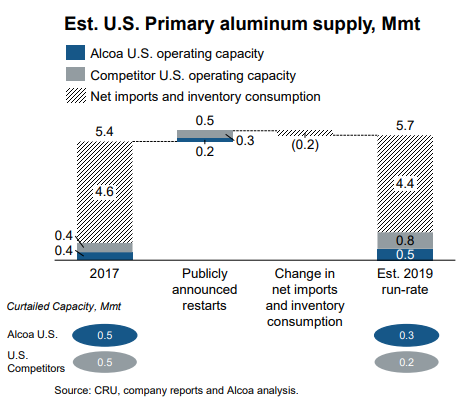Canada

August 7, 2018
Alcoa Requests Tariff Exemption for Canadian Operations
Written by Sandy Williams
A major aluminum company has requested that Canada be exempt from Section 232 aluminum tariffs so that it can import alloy from its Canadian mills.
Alcoa has three smelting facilities in Canada and three in the United States, as well as other global locations. The Baie-Comeau facility in Quebec produces specialty aluminum in 24-inch slabs, which are rolled into sheet at the Warrick facility in Indiana. The aluminum sheet is used by customers to make food and beverage cans.
Alcoa said it does not have the capacity at its U.S. plants to produce the required alloy and it is not available from its competitor (and only other aluminum smelter in the U.S.) Century Aluminum.
“Century Aluminum has indicated that it does not have the molds to produce 24-inch thick slabs,” Alcoa said. “There are no other U.S. manufacturers currently capable of supplying the exact slabs meeting Alcoa’s specifications or an acceptable substitute.”
Aluminum smelting has declined in the U.S. in the last several years as electricity costs increased at the aging facilities and foreign smelters improved efficiency and costs. Only 14 percent of Alcoa’s aluminum was produced in the U.S. last year.

“While tariffs have pushed the Midwest premium higher providing U.S. aluminum producers with a benefit, there is no long-term certainty to the duration of those tariffs. Tariffs also distort the market by incentivizing the restart of aged inefficient capacity, which contributed to curtailments and closures in the first place.”
Harvey added that the newest smelter in the U.S. is about 40 years old. About 300,000 metric tons of U.S. capacity has been added due to smelter restarts because of the tariffs, said Harvey, all of it from competitors. Alcoa plans to restart the smelter at Warrick to benefit its rolling mill, but capacity will remain curtailed at all three of its U.S. smelters.
Alcoa announced that due to current market prices, trade actions and operational factors, the company is reducing its 2018 adjusted EBITDA outlook to between $3.0 billion and $3.2 billion, down from $3.5 billion to $3.7 billion. Although the average realized price on raw aluminum surged 19 percent in the second quarter year-over-year, tariffs are costing the company between $12 million and $14 million per month.
When the Section 232 tariffs were first posted by the administration, Alcoa asked that Canada and allied trading partners be exempted from the 10 percent duty. In its submission on Monday, Alcoa filed five applications for one-year exclusions on primary aluminum alloyed slab from Canada.
“Once we see whether serious objections have been raised, it will be easier to evaluate the Alcoa application,” said James Rockas, a spokesperson for the Commerce Department, in an email to the New York Times.
According to the NYT, Century Aluminum has filed objections to several requests for aluminum exemptions and plans to restart a smelter in Kentucky.
In the steel industry, companies are finding their requests denied because of objections from steel producers. Alcoa could find itself in the same bind if objections are raised.






